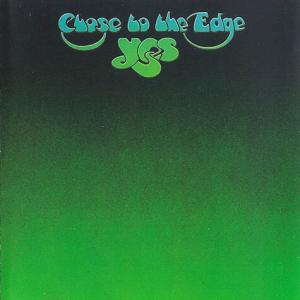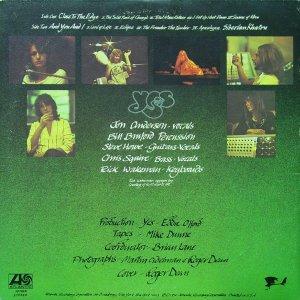Close To The Edge
by Yes


Artist:
Yes
Label:
Atlantic
Catalog#:
SD 7244
Format:
Vinyl
Country:
United States
Released:
1972-09
| Tracklist | |||
| A.1 | The Solid Time Of Change | ||
| A.2 | Total Mass Retain | ||
| A.3 | I Get Up I Get Down | ||
| A.4 | Seasons Of Man | ||
| B1.1 | Cord Of Life | ||
| B1.2 | Eclipse | ||
| B1.3 | The Preacher The Teacher | ||
| B1.4 | The Apocalypse | ||
| B2 | Siberian Khatru | 9:50 | |
Credits
Bass, Vocals - Chris Squire
Drums, Percussion - Bill Bruford
Guitar, Vocals - Steve Howe
Keyboards - Rick Wakeman
Producer - Eddy Offord
Producer - Yes
Tape - Mike Dunne
Vocals, Written-By - Jon Anderson
Strawberry Bricks Entry:
If both prior Yes albums had any shortcomings (and they had very few), it was due to growing pains. The Yes Album brought out the extended, epic composition, but suffered, perhaps, in execution. Fragile was well-executed, but only contained a half-hour of music—solo tracks notwithstanding. However, by the time their next album was recorded, the band had remained stable for almost a year. In the interim, Yes issued a massive arrangement of Paul Simon's "America" (similar to that of the pre-Clouds band, 1-2-3). Close To The Edge contains three tracks; the album's title composition fills side one: Steve Howe's blistering lead starts the opening section "The Solid Time of Change" with fury; and straight through to the second section, "Total Mass Retain," the intensity never lets up. Next are the gentle pulses and large chords of "I Get Up, I Get Down;" lyrically a bit twee, but it avoids any musical miscue. Fortunately, Yes knows how to end a piece and the final section of "Seasons of Man" is no exception. Rick Wakeman delivers an epic if speedy organ solo before the track resolves into its final symphonic refrain. From the moment the needle hits the first groove of the record, the four sections of the track flow seamlessly together, offering nothing short of definitive prog rock. Side two holds the other two tracks: The delicate organ beneath Howe's 12-string that opens "And You and I" is a typical example of the album's detail. The song was one of Jon Anderson's lyrical triumphs; his choice of words is as musical as the rest of the band's instrumentation. From here, however, their translation would garner biblical-like fascination. The final track, "Siberian Khatru," is another classic; dense and foreboding, Chris Squire's bass drives the particularly heavy song over Wakeman's chiming Mellotron. The album was another great success for the band, reaching No. 4 and No. 3 on the UK and US charts, respectively. Bill Bruford took his leave shortly after the album was recorded to join the revival of King Crimson. Later he claimed that he'd gone as far as he could go with Yes, and he may have been right, as this album was the culmination of Yes' musical progression to date.

